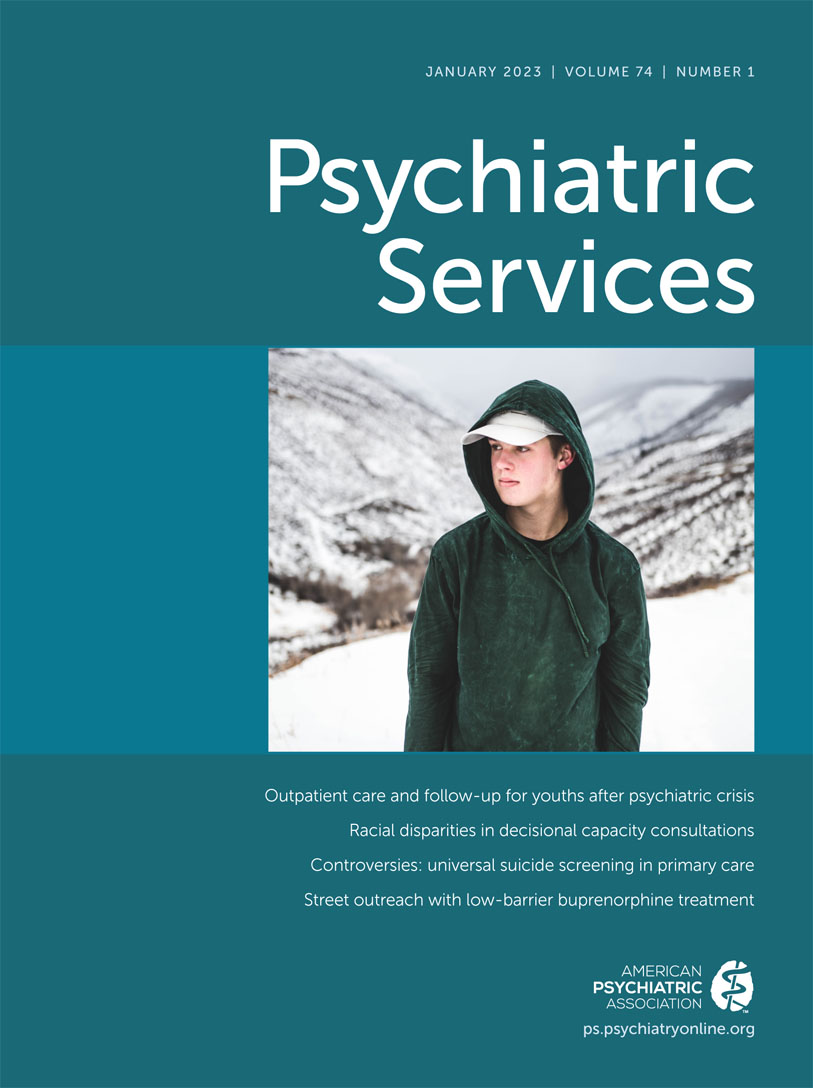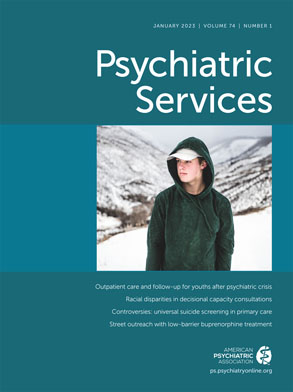Despite the prevalence of psychiatric disorders in the United States, surveys have shown that less than half of children and adolescents with a psychiatric disorder receive specialty mental health services (
1). This service gap can be attributed in part to the severe national shortage of child and adolescent psychiatrists (CAPs) and the concentration of CAPs in coastal and urban areas (
2).
In this context, pediatric primary care practitioners (PCPs) have had to manage a broad range of mental illnesses by default. To better support PCPs, 46 states and territories offer child psychiatry access programs (CPAPs) to provide PCPs with access to child psychiatry consultation. The goal of CAP consultation is to facilitate PCPs’ management of mild to moderate presentations of psychiatric disorders (anxiety, depression, attention-deficit hyperactivity disorder [ADHD]) that are common in their practices (
www.nncpap.org), thereby reserving CAPs’ services for the treatment of severe, complex, treatment-resistant, or unsafe presentations.
Consultation can be indirect (typically by telephone) or direct (typically face to face, either virtual or in person). Indirect consultation involves on-demand advice from a CAP to the PCP regarding diagnosis, medication management, or level-of-care considerations based on the PCP’s case presentation. If the consultation question cannot be easily answered by telephone, the PCP can request direct consultation in order to seek diagnostic clarification, specific treatment recommendations, or level-of-care advice. With direct consultation, a CAP performs a scheduled evaluation of the patient and conveys diagnostic impressions and treatment suggestions in a written report to the PCP.
Substantial research has shown CPAPs to be feasible, useful, and sustainable (
3). In addition, patients and families may perceive substantial benefits when receiving behavioral health care in the primary care setting, including decreased stigma, increased trust, and convenience (
4). CPAPs are funded by a wide variety of state, local, and insurance payer sources (
www.nncpap.org), supplemented recently by a substantial infusion of federal support (
5). Patients bear no cost for their PCPs’ participation in a CPAP.
Massachusetts CPAP
The first CPAP to launch in the United States was the Massachusetts Child Psychiatry Access Program (MCPAP) (
www.mcpap.com). Since 2004, MCPAP has provided indirect and direct consultations to PCPs through seven hubs in academic medical centers in Massachusetts, each supporting pediatric practices in its surrounding geographic region. Together, the seven MCPAP hubs offer CAP consultation services to over 500 pediatric practices that serve over 95% of the children in Massachusetts (
www.mcpap.com). Historically, around 28% of indirect MCPAP consultations have been referred for direct MCPAP consultations.
Study Rationale and Design
Because nearly all previous studies of MCPAP and other CPAP outcomes have focused on utilization of and satisfaction with the indirect consultation component (
3), our objective in this analysis was to examine the utilization and disposition of direct CAP consultations available to MCPAP-enrolled PCPs in a single MCPAP hub. We sought to ascertain whether the direct consultation referrals to this hub were consistent with the stated goal of PCP management of the case. Because this analysis was consistent with our institution’s definition of a quality improvement program, institutional review board approval was not required.
In our MCPAP hub, direct consultation is conducted by two board-certified CAPs with staff privileges at our academic medical center, under the oversight of a senior attending CAP at the medical center who is also a medical codirector of MCPAP. The CAPs were trained to be consistent in their approach to consultation (e.g., use of symptom rating scales, structure of the consultation, reports to PCPs). The consultation comprises previsit completion by the patient’s parent or guardian of a MCPAP evaluation consent form, a child and family history questionnaire, and the American Psychiatric Association Level 1 Cross-Cutting Symptoms Measure (selected for its breadth, brevity, and cost-free availability) (
6). The consultant also reviews all available MCPAP records for prior consultations, if applicable. During the visit, relevant focused symptom rating scales and a clinical psychiatric interview of the patient and parent or guardian (separately or together as developmentally appropriate) are administered. Psychiatric diagnoses in accordance with the
DSM-5 and clinical formulations are assigned by the consulting CAP. Findings from the consultation, with diagnoses and treatment suggestions as indicated, are mailed to the PCP and parent or guardian via separate written reports. Most direct consultations are completed in one visit, typically lasting 90 minutes. Consultations involving children under 18 include both a parent or guardian and the child; consultations involving adults ages 18 or over do not include parents unless requested by the adult patient.
Study Outcomes
During the period of observation for this study (July 1, 2018–June 30, 2019), statewide there were 4,808 indirect MCPAP consultations leading to 1,761 direct consultations (37% of indirect consultations). Our MCPAP hub was the geographically determined recipient of 136 of the 1,761 referrals for direct consultation. Referrals came from 32 (43%) of 75 practices eligible for consultation. Of the 136 referrals, 111 were scheduled (82%). Two parents did not provide consent for consultation, yielding a final sample of 109 direct consultations.
Characteristics of the direct consultations are provided in
Table 1. The mean number of consultations per practice was 3.5 (range 1–8). The age range of referred patients was 4–24 years (mean=12 years). Sixty-two percent of consultations were for male patients and 38% for female patients. The PCP’s reason for all consultations was noted to be for diagnostic clarification, treatment recommendations, or level-of-care advice.
Postconsultation diagnoses were anxiety disorders (78%), depressive disorders (59%), ADHD (40%), substance-related disorders (14%), and other disorders (autism spectrum, psychotic, obsessive-compulsive, reactive attachment, oppositional defiant, conduct, and trauma-related disorders) (48%). The percentages of diagnoses sum to greater than 100% because of concurrent diagnoses.
The severity of the presentations was assessed with the Children’s Global Assessment Scale (CGAS) (
7). Among all consultations, 1% (N=1) were scored as generally well (score >70), 9% (N=10) as mild (score 61–70), 76% (N=83) as moderate (score 41–60), and 14% (N=15) as severe (score 1–40). The complexity of the presentations was demonstrated by 41% (N=45) of patients having one or more comorbid medical conditions (27 different medical illnesses were represented, predominantly asthma, sleep disorders, concussion, celiac disease, eczema, cerebral palsy, Lyme disease, and migraine), by 32% (N=35) having two comorbid psychiatric conditions and 12% (N=13) having three or more comorbid psychiatric conditions (12 psychiatric disorders were represented, predominantly autism spectrum, adjustment, obsessive-compulsive, social communication, intermittent explosive, and conduct disorders), and by 56% (N=61) having a previous or current medication trial, with 20% having a previous failed medication trial and 25% (N=27) having a previous emergency or crisis visit.
Postconsultation, by mutual CAP-PCP agreement, 60 patients (55%) remained with the PCP for management. Suggestions for management were provided in the CAP report letter, including the offer to continue to provide subsequent consultation (indirect or direct) for ongoing management questions, such as change in status requiring referral to specialty care.
Postconsultation, 42 patients (39%) were referred to outpatient psychiatry services, and seven (7%) required intensive (inpatient community-based acute treatment, partial hospitalization) psychiatric services. Of the 42 patients referred to outpatient psychiatric services, 12 (29%) had CGAS scores in the severe range, 29 (69%) had scores in the moderate range, and one (2%) had a score in the mild range. The cases of moderate severity referred to outpatient psychiatry were those deemed by PCPs and CAPs to be too complex (medical or psychiatric) to be managed in the primary care setting. All patients referred for intensive psychiatric services had scores in the severe range. No medications or other treatments were initiated by consulting psychiatrists, as is consistent with their consulting role.
Discussion
In this study, we found that PCPs geographically linked to our MCPAP hub utilized direct psychiatric consultation as intended, in that a majority of cases were managed without referral to specialty care.
These findings are consistent with the few previous studies of direct CAP consultation in the United States. The three largest of these studies (
8–
10) together demonstrated the broad age range of referred patients; the predominance of moderate to severe anxiety, depression, and ADHD as reasons for consultation; the moderate complexity of cases referred for consultation; and (except for Connor et al. [
8]) the predominance of postconsultation disposition to the PCP for ongoing management, with a minority of cases referred to specialty care. That findings similar to ours were obtained for three different models of direct CAP consultation (regional grant-funded consultation in Massachusetts [
8], academic medical center–affiliated fee-for-service in Florida [
9], and statewide grant-funded consultation embedded in a behavioral health integration program in Massachusetts [
10]) suggests the robustness of this type of consultation in multiple locally adapted configurations.
Despite the limitations of our small sample size, the general consistency of findings across studies also suggests that direct CAP consultation may play a key role in task shifting, that is, the shifting of certain specialty behavioral health tasks (e.g., management of mild to moderate presentations of common psychiatric disorders, even with some degree of complexity) to primary care. Although PCPs historically report feeling comfortable with the identification, assessment, and treatment of ADHD, because they are often exposed to this disorder in their training, this confidence does not fully extend to the identification, assessment, and treatment of depressive and anxiety disorders (
11). Consultation programs can play an important role in enhancing PCPs’ confidence in managing common disorders beyond ADHD.
Olfson et al. (
12) showed that the prevalence of outpatient specialty behavioral health treatment was about twice as high among youths with less severe impairment as for those with more severe impairment and that roughly two-thirds of new treatment episodes involved youths without severe impairment. If these patients can instead be managed by PCPs in the primary care setting with support from CPAPs, the services of scarce behavioral health specialists can be reserved for youths with more severe and complex presentations.
Further research is needed to ascertain factors associated with PCPs’ choice to use available direct consultation services, PCP and parent satisfaction with direct CAP consultation services, factors (e.g., PCP behavioral health education) associated with the amplification of CAP consultation impact, whether direct CAP consultation decreases the costs of providing behavioral health care, and clinical outcomes associated with PCP management of mild to moderate psychiatric disorders.
The findings from this and other CPAP studies support the potential of CPAPs to increase access to care for psychiatric disorders by creating consultative relationships between PCPs and CAPs and to enable the delivery of this care in medical home settings, where patients and families may feel most comfortable.

